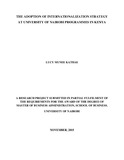| dc.description.abstract | The internationalization of higher education is a dynamic process, continuously shaped and reshaped by the international context in which it occurs. As this context changes, so do the purpose, goals, meanings, and strategies of internationalization. The current study adopted the Uppsala model which describes internationalization of a firm as a process of experiential learning and incremental commitments which leads to an evolutionary development in a foreign market.The research objective of this study was to investigate the strategies adopted by the University of Nairobi in internationalizing its programs. The study also investigated the policies and challenges facing the adoption of internationalization of programmes at the university. The study utilized data collected from randomly selected professors and administrative staff representing various departments and faculties of the University of Nairobi which deals with internationalization of programmes. There was also data from secondary sources such as university journals, policies and other publications. The respondents were mainly drawn from the college of Biological and Physical Sciences, College of Humanities and Social sciences and College of Health Sciences which was a representative sample of the faculties/departments offering programmes to foreign students. A descriptive Research technique was used for data analysis which targeted internationalization of programmes at the University of Nairobi and presentation of the results was done through percentage distributions, bar graphs and pie charts. The findings revealed that six strategies were being adopted for the internationalization of programmes. This were identified as; Review Curriculum to develop courses which can attract foreign students; Signing partnerships and linkages with foreign universities to market UON programmes internationally; Promote publications in international journals; Benchmarking with the best practices regionally and internationally; Aggressive marketing, review admission procedures and fees structures for foreign students and Improvement on infrastructure and accommodation for the foreign students. Overall, all the strategies were found significant in the adoption of internationalization of the University of Nairobi programmes. The policies in support of internationalization of programmes at the University of Nairobi includes; the policy on partnerships and linkages and the implementation of the University of Nairobi strategic plan. A number of challenges key among them, accommodation for foreign students and inadequate budget for the programme. The study recommends that the University of Nairobi should promote internationalization and its visibility by increasing the number of international student‟s intake each academic year. Further the centre of international links and programs should be managed efficiently and re-energize all its operations, by developing operational guidelines to carry out functions as per the statutes. As a way forward in internationalization of its programmes, the University of Nairobi should create collaborative teaching, research and training. This is by establishing viable university and industry linkages in the area of research and development and student‟s attachment. This could be achieved through the promotion of the university objectives in the international arena as a source of new and significant knowledge which can inform policy. | en_US |

